
Materials Research Express
Scope & Guideline
Championing open-access research for all materials enthusiasts.
Introduction
Aims and Scopes
- Materials Characterization:
The journal publishes studies that involve the detailed characterization of materials using various techniques, such as spectroscopy, microscopy, and mechanical testing, to understand their properties and behaviors. - Synthesis and Processing of Materials:
Research articles often focus on novel synthesis methods, including green chemistry approaches, and the processing of materials to enhance their performance, such as additive manufacturing and surface modification. - Nanomaterials and Nanocomposites:
There is a significant emphasis on the development and application of nanomaterials, including their synthesis, properties, and potential applications in various fields such as electronics, catalysis, and medicine. - Sustainable Materials and Green Chemistry:
The journal highlights research on sustainable materials and methods, including the recycling of materials, and the development of biodegradable composites as part of a broader commitment to environmental sustainability. - Functional and Smart Materials:
Papers discussing the design and application of functional materials, including thermoelectric, piezoelectric, and magnetic materials, are common, showcasing their potential for use in advanced technology applications. - Computational Materials Science:
The journal also features studies that employ computational models to predict material behavior, properties, and performance, integrating theoretical approaches with experimental findings.
Trending and Emerging
- Biomaterials and Biocompatibility:
There is a growing trend towards research on biomaterials, particularly those that are biocompatible and can be used in medical applications, such as drug delivery systems and tissue engineering. - Energy Materials:
Research on materials for energy applications, including batteries, fuel cells, and solar cells, has gained prominence, driven by the global push for sustainable and renewable energy solutions. - Nanotechnology and Nanocomposites:
The focus on nanotechnology continues to expand, with increased research on nanocomposites that leverage the unique properties of nanomaterials for enhanced performance in various applications. - Smart and Functional Materials:
Emerging themes include the development of smart materials that respond dynamically to their environment, including shape-memory alloys and stimuli-responsive polymers. - Machine Learning in Materials Science:
The integration of machine learning and artificial intelligence in materials research is on the rise, with studies focusing on predictive modeling and optimization of material properties. - Environmental Sustainability and Recycling:
Research emphasizing sustainable practices, such as recycling and waste valorization in materials development, is increasingly prevalent, aligning with global sustainability goals.
Declining or Waning
- Traditional Metal Alloys:
Research solely focused on traditional metal alloys without innovative modifications or applications has decreased, as the field has shifted towards more advanced materials and composites with specific functionalities. - Basic Material Studies without Application:
There is a waning interest in purely fundamental studies of materials that do not lead to practical applications or advancements in technology, as researchers increasingly seek to connect their work to real-world implications. - Conventional Chemical Synthesis Methods:
Studies utilizing conventional chemical synthesis methods without any novel approaches or enhancements have diminished, as there is a growing emphasis on green chemistry and sustainable practices. - Low-Priority Applications of Materials:
Research focusing on low-impact applications of materials, particularly in industries that are not aligned with current technological trends (e.g., low-tech consumer goods), appears to be declining.
Similar Journals

Journal of Metals Materials and Minerals
Connecting Researchers in Metals and Materials EngineeringJournal of Metals Materials and Minerals (ISSN: 0857-6149) is a renowned academic publication dedicated to the interdisciplinary fields of metallurgical science, materials engineering, and mineralogy. Published by Chulalongkorn University, Metallurgy & Materials Science Research Institute in Thailand, this journal serves as a pivotal platform for researchers to disseminate their findings and explore innovative applications related to metals, ceramics, polymers, and biomaterials. Although the journal does not currently adopt an open-access model, it provides insightful content that facilitates knowledge sharing among professionals and academics alike. The journal has established its credibility with impressive Scopus ranking percentiles, particularly in categories such as Metals and Alloys and Ceramics and Composites. With an emphasis on advancing the understanding of materials science from 2017 to 2024, the Journal of Metals Materials and Minerals remains an essential resource for those striving to contribute to and stay informed about the latest trends and breakthroughs in these dynamic fields.
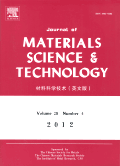
Journal of Materials Science & Technology
Advancing Innovation in Materials ScienceThe Journal of Materials Science & Technology, published by JOURNAL MATER SCI TECHNOL in China, is a leading forum for the latest research in the multidisciplinary field of materials science. With the ISSN 1005-0302 and E-ISSN 1941-1162, this esteemed journal boasts an impressive impact factor and has established itself as a vital resource for professionals, researchers, and students alike. Covering a wide range of topics, including ceramics, composites, materials chemistry, mechanical engineering, and polymers, it has achieved a coveted Q1 ranking in multiple categories as of 2023, reflecting its position in the top tier of scholarly publications. Notably, the journal excels in its Scopus ranks, placing within the top 5% in categories such as Metals and Alloys and Mechanical Engineering. Aiming to foster knowledge and innovation in material development and application, the journal is committed to facilitating groundbreaking research and collaborations that propel the field forward. With its convergence of insights from 1993 to 2025, the Journal of Materials Science & Technology remains an indispensable resource for the advancement of materials science.
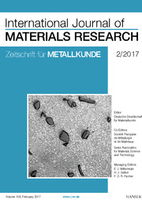
International Journal of Materials Research
Bridging Theory and Application in Materials ScienceInternational Journal of Materials Research is a prestigious academic platform specializing in the dissemination of cutting-edge research in the fields of materials science and condensed matter physics. Published by Walter de Gruyter GmbH, this journal serves as a vital resource for researchers, professionals, and students interested in the innovations shaping the materials landscape today. With an impact factor that reflects its growing influence, this journal offers an array of open access options, allowing for broad dissemination and accessibility of published findings. Spanning research from 1994 to 2024, the journal consistently ranks in the Q3 and Q4 quartiles across key subcategories, including materials chemistry, metals and alloys, and physical and theoretical chemistry. By bridging the gap between theoretical frameworks and practical applications, the International Journal of Materials Research provides an essential forum for advancing knowledge and fostering collaborations within the materials research community.

MATERIALE PLASTICE
Elevating the Study of Chemistry and EngineeringMATERIALE PLASTICE is a distinguished academic journal published by REVISTA CHIMIE SRL in Romania, focusing on the fields of Chemistry, Materials Science, and Engineering. With an ISSN of 0025-5289 and an E-ISSN of 2668-8220, this journal has a historical commitment to advancing the study of polymers and plastics since its inception in the early 1970s. Although classified in the Q4 category across multiple disciplines including miscellaneous chemistry and materials chemistry as of 2023, it serves as an important forum for researchers and professionals dedicated to innovative materials research and development. The journal’s resources, though not openly accessible, are pivotal for scholars seeking to deepen their knowledge in the mechanics of materials and interdisciplinary applications. MATERIALE PLASTICE is not only a repository of significant research findings but also a platform for fostering collaboration and discussion among a global audience that continues to strive for scientific excellence in polymer and materials studies.
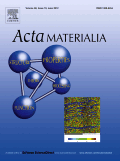
ACTA MATERIALIA
Connecting Researchers to the World of Materials InnovationACTA MATERIALIA is a premier journal in the field of materials science, published by PERGAMON-ELSEVIER SCIENCE LTD. With an ISSN of 1359-6454 and an E-ISSN of 1873-2453, this esteemed journal serves as a vital platform for disseminating high-quality research across various critical domains, including ceramics and composites, electronic, optical and magnetic materials, metals and alloys, and polymers and plastics. Recognized for its impact in the field, ACTA MATERIALIA boasts a remarkable standing, featuring a Q1 ranking in multiple categories as of 2023, solidifying its importance among the top journals in materials science. Researchers and professionals benefit from open access options, ensuring that groundbreaking findings are available to a global audience. Operating out of the United Kingdom, ACTA MATERIALIA strives to advance knowledge and innovation within the materials science community, making it an invaluable resource for academics, industrial professionals, and students dedicated to the future of material engineering and technology.

Accounts of Materials Research
Elevating knowledge in the realm of materials chemistry.Accounts of Materials Research is a premier journal published by the American Chemical Society, focusing on the multidimensional field of materials science. With a robust impact factor and a commitment to open-access research, it serves as a vital platform for leading-edge discoveries from 2020 to 2024. The journal has rapidly ascended to the top quartile in multiple categories, including Chemical Engineering, Materials Chemistry, and Polymers and Plastics, demonstrating its significant influence within the academic community. Recognized by Scopus as a key resource—with remarkable rankings that place it in the 95th percentile of its field—Accounts of Materials Research is devoted to publishing high-quality, innovative research that addresses critical challenges in materials development and implementation. This journal is essential for researchers, professionals, and students seeking to stay informed about the latest advancements and collaborative opportunities within the interdisciplinary landscape of materials science.
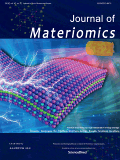
Journal of Materiomics
Connecting Researchers with Cutting-Edge DevelopmentsThe Journal of Materiomics, published by Elsevier, stands at the forefront of research in the interdisciplinary fields of materials science, particularly focusing on Electronic, Optical and Magnetic Materials, Metals and Alloys, and Surface Coatings and Films. Since its inception in 2015, this Open Access journal has fostered innovative research and theoretical advancements, facilitating the dissemination of knowledge with a global audience. With an impressive impact factor and consistently ranked in the top tiers of its categories — notably Q1 in 2023 for all its major focus areas, the journal positions itself as a vital resource for researchers, professionals, and students seeking to explore cutting-edge developments in materials science. Based in Amsterdam, Netherlands, the journal encourages the rigorous investigation of material interactions at the nanoscale, fostering advancements that underscore the applicability of materials across various industries. By providing a platform for high-quality research, the Journal of Materiomics plays a critical role in shaping the future of material technologies.
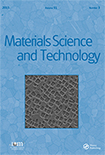
MATERIALS SCIENCE AND TECHNOLOGY
Connecting Academia and Industry through Materials InsightsMATERIALS SCIENCE AND TECHNOLOGY is a leading journal published by SAGE PUBLICATIONS INC, focusing on the interdisciplinary advancements in the field of materials science. Since its inception in 1984, the journal has provided a platform for researchers and industry professionals to present innovative findings through rigorous peer-reviewed articles. The journal holds a commendable impact factor and categorizes itself within the prestigious Q2 rank in various domains such as Condensed Matter Physics, Materials Science, Mechanical Engineering, and Mechanics of Materials according to the 2023 Quartiles. With no Open Access option, it primarily serves as a repository for in-depth studies and advancements that push the boundaries of materials engineering and application. Located in the United Kingdom, at 2455 TELLER RD, THOUSAND OAKS, CA 91320, the journal continues to attract a global readership, making it indispensable for academics, researchers, and students who aim to stay at the forefront of materials innovation.

JOURNAL OF ELECTRONIC MATERIALS
Elevating Knowledge in Condensed Matter Physics and BeyondWelcome to the Journal of Electronic Materials, a premier publication in the field of materials science. Published by Springer, this esteemed journal has been a beacon for groundbreaking research in electronic, optical, and magnetic materials since its inception in 1972. As an established resource, it boasts a commendable impact factor and categorically ranks in the second quartile (Q2) in key areas such as Condensed Matter Physics and Electrical and Electronic Engineering, as well as holding a respectable third quartile ranking in fields related to Electronic, Optical, and Magnetic Materials and Materials Chemistry. Researchers, professionals, and students can access a wealth of knowledge as we publish original articles, reviews, and cutting-edge research that push the boundaries of science and technology in these critical fields. Stay informed and engaged as we explore advancements that shape the future of electronic materials.

Nano Express
Bridging theory and application in materials science.Nano Express is an esteemed open-access journal published by IOP Publishing Ltd, dedicated to advancing research in the fields of nanotechnology and materials science. Since its launch in 2020, the journal has swiftly established itself as a vital resource for researchers and professionals, garnering significant recognition in various domains, including biomaterials, electronic, optical and magnetic materials, and polymers and plastics. With a commendable categorization in Scopus quartiles, it ranks in Q2 for Electronic, Optical and Magnetic Materials, and maintains a top percentile in several others, exemplifying its commitment to high-quality research dissemination. Located in the United Kingdom, this journal fosters a global dialogue among experts and newcomers alike, facilitating open access to innovative research that drives the future of nanotechnology. By offering a platform for groundbreaking studies and reviews, Nano Express aims to bridge the gap between theoretical understanding and practical application, championing the development of next-generation materials that have the potential to transform various industries.